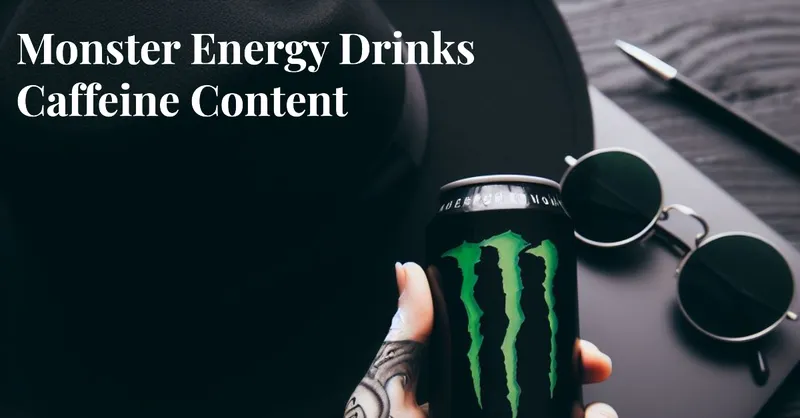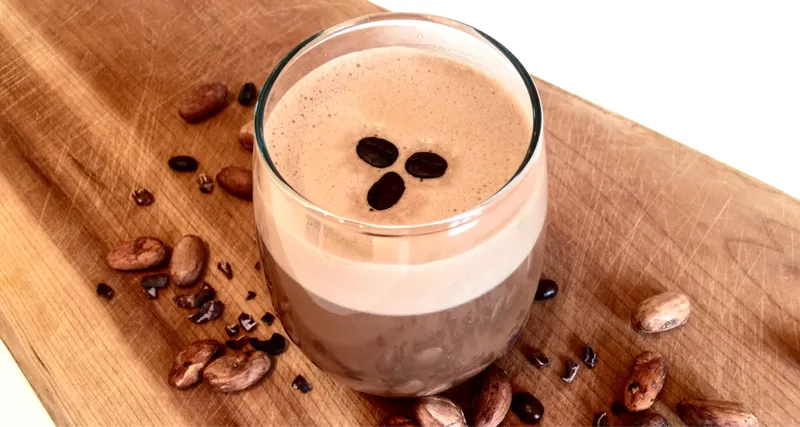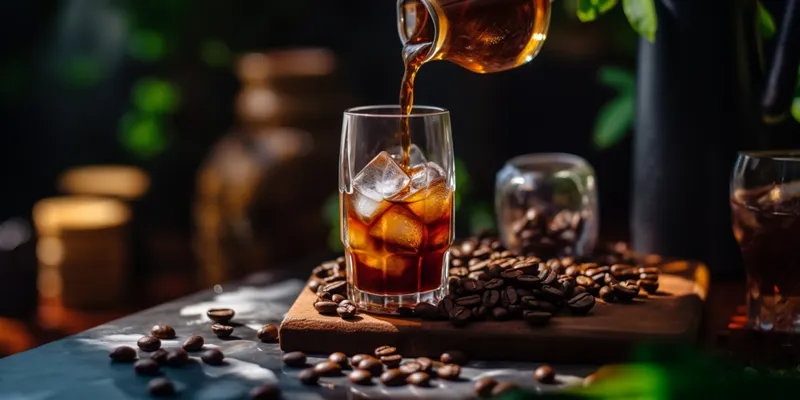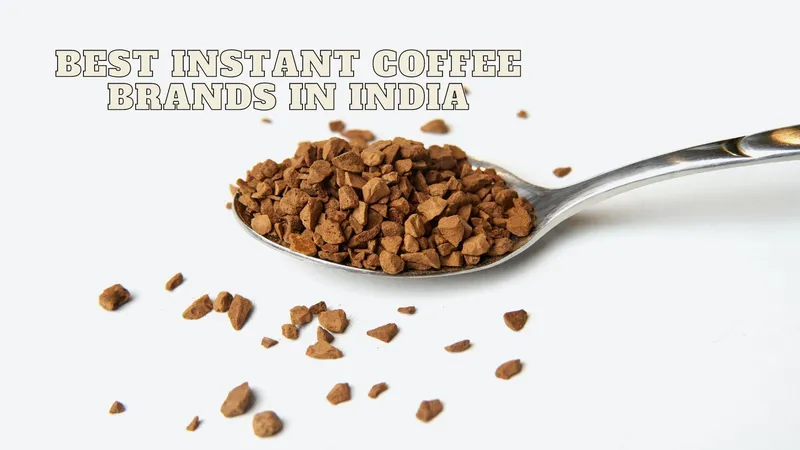Since its launch in 2002, Monster Energy has emerged as a prominent player in the global energy drink market, ranking as one of the best-selling brands, second only to Red Bull. The company has strategically positioned itself in the realm of action sports, sponsoring numerous athletes in activities such as skateboarding, BMX, and mountain biking. This active involvement has greatly contributed to its swift rise in popularity.
The primary ingredients responsible for the energy-boosting effects of Monster Energy are sugar and caffeine. But just how much caffeine is packed into each can of Monster Energy, and how does this compare to your typical cup of coffee? In this article, we delve into the caffeine content per serving and explore how it can vary significantly from your beloved coffee brew. Let's dive in!
How Much Caffeine Is In A Monster Energy Drink?
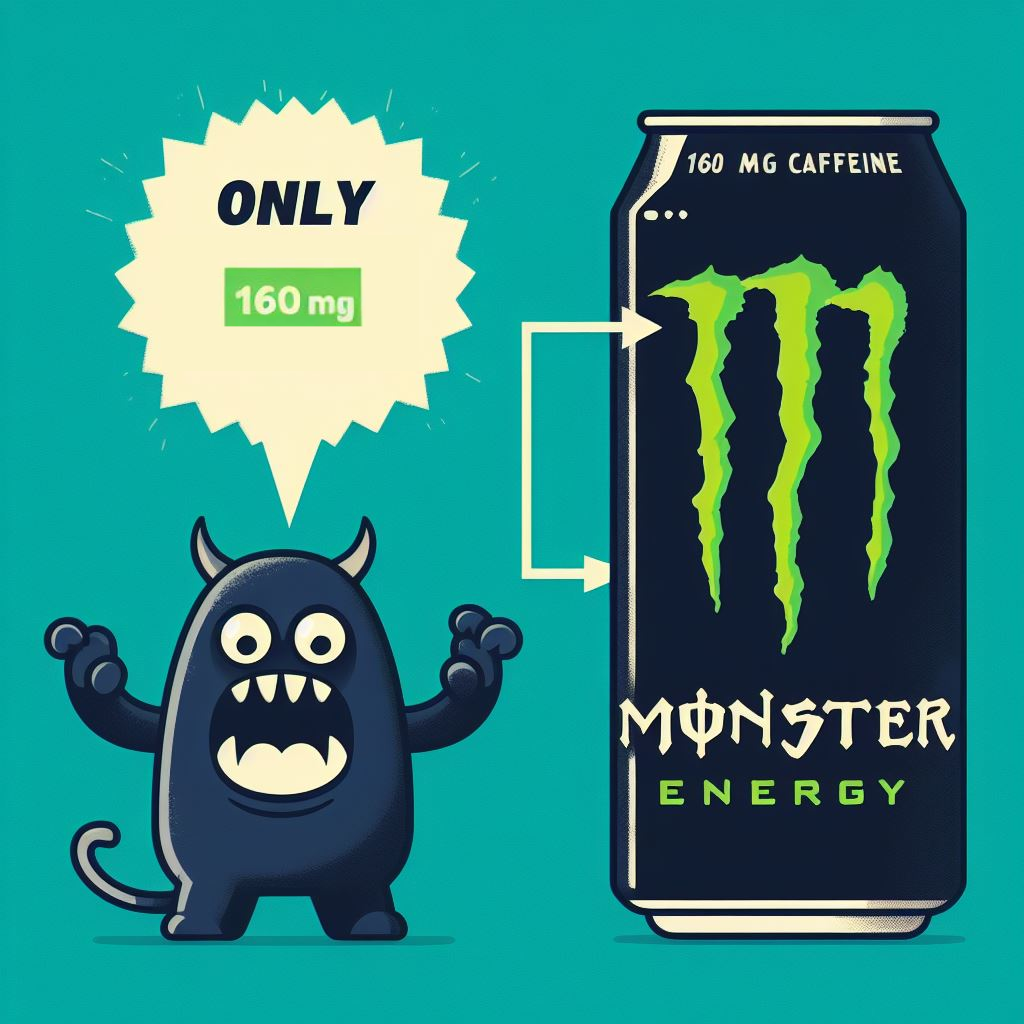
This energy drink falls somewhere between Red Bull and Bang Energy in terms of caffeine content. If you're not accustomed to it or not expecting it, you might experience feelings of jitteriness or anxiety, similar to taking caffeine pills instead of consuming it through a beverage.
Within the extensive Monster Energy lineup of over 50 different varieties, you'll find varying caffeine levels. For instance, "Java Monster" packs a staggering 300 mg of caffeine per can, while "Monster Unleaded" contains less than 20 mg. Although most of these options are exclusive to the United States, apart from these two examples, the caffeine content remains consistent throughout the range.
The original green Monster Energy drink contains 160 mg of caffeine in a 16-oz. can, while the "Mega Monster" is another popular choice, boasting 240 mg of caffeine in a resealable 24-oz. can.
It's important to note that not all caffeine is created equal, and many consumers may not realize that their preferred energy drink may contain synthetically produced caffeine. While synthetic and naturally occurring caffeine is chemically similar, synthetic caffeine undergoes numerous conversion steps from its initial form, ammonia, and may be exposed to harsh chemicals during synthesis. In small quantities, this is generally not harmful, but consuming large amounts regularly could become problematic. Additionally, synthesized caffeine is absorbed more rapidly through the digestive system, leading to a quicker energy spike and, unfortunately, a faster crash.
Monster Energy doesn't specify whether the caffeine used is natural or synthetic in its ingredient list. However, given the widespread use of synthetic caffeine in most energy drinks, it's reasonable to assume that it likely originates from an artificial source.
Monster Zero Caffeine Content
Wondering about the caffeine in Monster Zero, the sugar-free version of the classic Monster drink? Yes, it does have slightly less caffeine. Monster Zero contains 140 mg of caffeine, which is 20 mg less than the regular Monster. While it's still relatively high, it's not as much as the 160 mg in the regular Monster, and it falls within the safe daily caffeine limit.
Monster Zero Ultra Caffeine Amount
Monster Zero Ultra, another sugar-free option in the Monster lineup, offers a slightly different flavor profile. It contains a bit less caffeine than the regular Monster but a bit more than Monster Zero, with 150 mg of caffeine. When choosing between these options, consider your flavor preferences rather than focusing on caffeine content, as the difference in caffeine levels isn't substantial.
Caffeine in a 24 oz Monster Energy Drink
While we've discussed 16 oz Monster drinks, it's worth noting that Monster Energy is available in other sizes, including the common 24 oz option. There’s a whopping 244 mg of caffeine in a 24 oz Monster.
That's an immense amount of caffeine. Even someone accustomed to consuming multiple cups of coffee each day might experience jitteriness if they were to opt for a 20 oz Monster Energy drink instead. This highlights the ongoing debate regarding caffeine content in coffee versus soda.
However, this raises another important question: what's the caffeine difference between coffee and Monster Energy drinks?
Comparing Monster Energy to Coffee
When it comes to caffeine content, a Monster Energy drink and an equivalent serving of coffee generally contain similar amounts of caffeine. However, it's important to note that coffee's caffeine content can vary significantly based on factors like the roast, brewing method, and coffee bean variety.
For conventionally brewed coffee, which involves pouring hot water over coffee grounds using a filter or a French press, the average caffeine content is approximately 100 mg per 8-ounce serving. Espressos, on the other hand, tend to have higher caffeine concentrations than regular brewed coffee. However, since espressos are typically enjoyed in smaller servings, the overall caffeine intake remains lower. A standard espresso shot, measuring around 1.5 ounces, contains approximately 60-65 mg of caffeine, a similar caffeine content found in espresso-based beverages like cappuccinos and lattes.
In summary, both coffee and Monster Energy contain comparable levels of caffeine. However, it's worth noting that coffee is generally considered a healthier option for consumption.
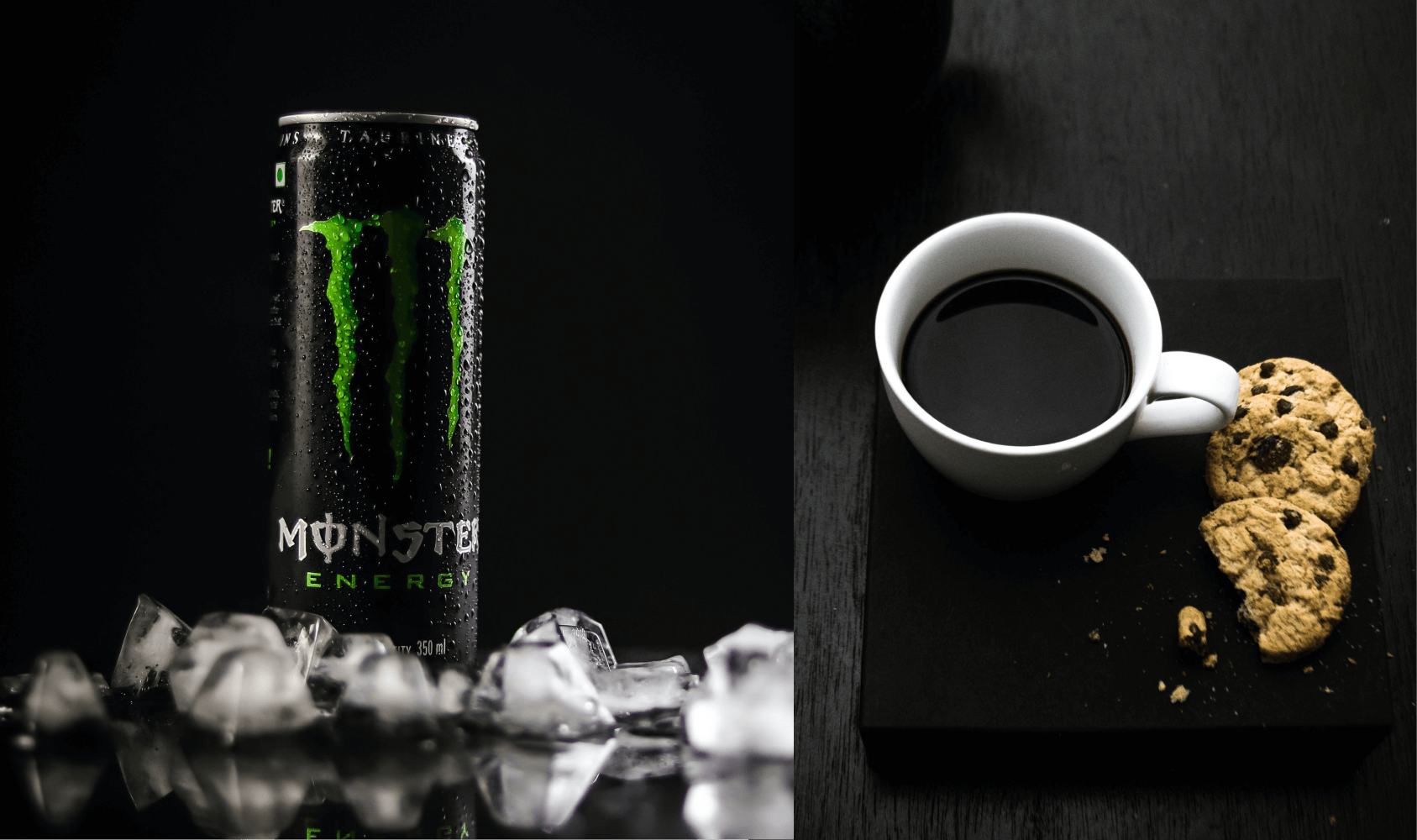
Can Monster Energy Drinks Enhance Performance?
When you're looking to stay awake for late-night study sessions or seeking an extra edge during workouts or sports competitions, energy drinks like Monster or a simple cup of coffee often come to mind. However, the issue with relying on energy drinks is their relatively short-lived energy boost, often followed by a noticeable crash. The duration of this effect can vary from person to person due to factors such as tolerance and metabolism, but on average, it takes about 12 hours for most individuals to fully process the caffeine from an energy drink, with a peak lasting 15 to 45 minutes.
For the majority of people, the initial energy surge provided by a Monster Energy drink typically begins to wane within an hour, leaving them feeling fatigued and sluggish. In practical terms, this means that while a Monster may offer a temporary cognitive and physical performance boost, it's likely to last no more than approximately 90 minutes. To sustain this energy, individuals often find themselves consuming more of the drink, potentially exceeding the recommended daily intake for both sugar and caffeine, which can lead to a more significant crash afterwards.
Varieties of Monster Energy Drinks
Monster offers a diverse lineup of energy drinks, each falling into specific categories to cater to different preferences and needs:
- Original Monster: These are the classics that laid the foundation for Monster. Packed with both sugar and caffeine, they are the quintessential Monster experience.
- Monster Ultra: For those seeking sugar-free options, the Ultra lineup provides a similar caffeine kick without the added sugar.
- Java Monster: A unique blend of coffee and Monster energy, ideal for those with a taste for adventure.
- Juice Monster: These drinks combine fruit juices with Monster energy blends and are non-carbonated for a refreshing twist.
- Rehab Monster: Designed for times when you require both electrolytes and energy in one, these Monster drinks offer a beneficial combination.
- Monster Iced Tea: Offering a caffeine boost with less caffeine than other Monster varieties, these drinks are a great choice for those who enjoy iced tea's flavour.
- Hydro Monster: This category focuses on providing electrolytes along with energy, making them among the healthiest options in the Monster lineup.
It's important to note that virtually all Monster drinks contain some level of caffeine, although the specific caffeine content may vary from the serving size to the per-can amount.
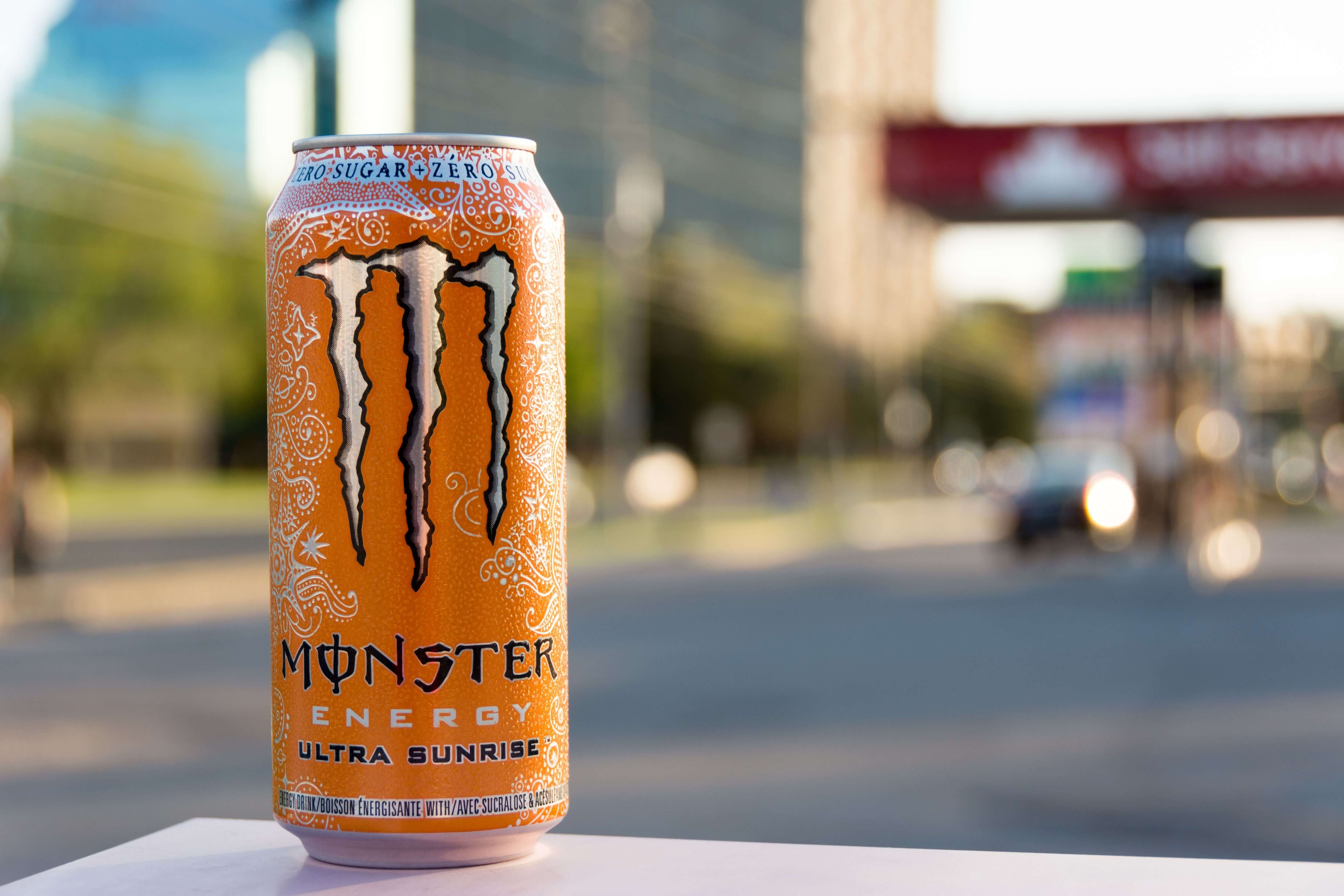
Is caffeine healthy for us?
As per FDA guidelines, a daily caffeine intake of approximately 400 mg is considered safe for healthy adults, which roughly equates to three to four small cups of coffee. However, it's essential to recognize that individual sensitivity to caffeine varies, and some people may experience heightened reactions to its effects. While coffee consumption has been associated with various health advantages such as increased longevity, reduced cancer risk, improved gut health, and enhanced liver health, it's worth noting that these benefits might be attributed to compounds within coffee other than caffeine itself.
Coffee Benefits: What You Need to Know
Caffeine offers potential health advantages, although not all are definitively proven by research.
- Weight Management: Caffeine may aid in weight management by reducing appetite and boosting thermogenesis, but long-term effects remain uncertain.
- Alertness: Caffeine can enhance attention and alertness, with doses ranging from 75 mg to 600 mg having various cognitive benefits. However, it can't replace the need for proper sleep.
- Sports Performance: Caffeine can improve endurance exercise performance, according to the European Food Safety Agency, but its impact on short-term, high-intensity exercise is less clear.
- Brain Function: Caffeine affects adenosine receptors and may help enhance cognitive skills and slow age-related cognitive decline, but more research is needed.
- Neurological Diseases: Lifelong caffeine consumption may reduce the risk of Alzheimer's disease and lower the risk of Parkinson's disease, according to studies.
- Memory: Some research suggests caffeine post-learning may boost long-term memory.
- Liver and Colon: Caffeine enemas are theorized to support detoxification, but the evidence is limited. Coffee consumption may decrease cirrhosis risk and slow hepatitis C progression.
- Eyelid Spasm: Caffeine may protect against blepharospasm, an abnormal eye condition.
- Cataracts: Research indicates caffeine may help protect the lens of the eye from damage.
- Skin Cancer: Caffeine applied to the skin may prevent UV-induced skin cancer. Drinking caffeinated coffee could reduce the risk of basal cell carcinoma.
- Kidney Stones: Increased caffeine consumption may lower the risk of kidney stone development.
- Oral Cancer: Drinking more than four cups of coffee daily may reduce the risk of death from oral cancer, based on a study of nearly a million participants.
While caffeine shows promise in these areas, it's essential to remember that more research is needed to confirm these potential benefits.
Final Thoughts
Wondering about the caffeine content in Monster energy drinks? A typical 16-oz. can of original Monster Energy contains approximately 160 mg of caffeine, though this may vary based on the specific variety you choose. This caffeine level is roughly equivalent to that found in two cups of coffee. However, it's worth noting that Monster Energy includes additional ingredients like glucose, and the caffeine may not be naturally sourced as it is in coffee.
While Monster Energy drinks have gained widespread popularity for their energy-boosting properties, it's important to consider that an occasional can of Monster may be acceptable. Nevertheless, a regular cup of coffee can offer similar effects without the addition of flavours and sugars, and many find it to be a more enjoyable choice.
